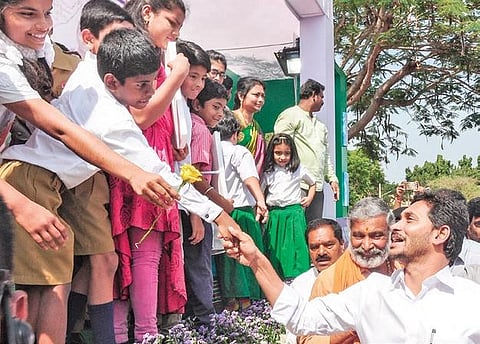Improving Andhra Pradesh’s literacy rate
The Andhra Pradesh government on Thursday launched its flagship scheme, Amma Vodi, to increase enrolment in schools and junior colleges with the long-term objective of making the state 100% literate. It is unique compared to schemes implemented by earlier governments in that it incentivises women from BPL families to send their children to school as it seeks to address one of the main reasons for the high school dropout ratio, which is poverty. Every mother is paid Rs 15,000 per annum so that she need not send her child to work to help sustain the family.
The enrolment ratio in Andhra Pradesh is around 83%, which is much lower than the national average. Simultaneously, the dropout ratio is high. The net result is that the state’s literacy rate is 61%, the lowest in the country. The worst part of it is that as per the Comptroller and Auditor General’s report, the state doesn’t even have a proper system in place to track school dropouts.
If we see these stats in combination with the NITI Aayog’s School Education Quality Index, on which the state ranks 11th, we get the full picture. Amma Vodi, which benefits 43 lakh families comprising over 81 lakh children, will have to be supplemented by a number of other steps if it is to succeed, since money alone cannot solve the problem. Once the scheme was announced last year, there was a 40% spike in admissions, but in the absence of proper infrastructure, enough number of teachers, and an environment and culture that encourage children to study, we will go back to square one.
The government is keen on improving infrastructure through its Naadu-Nedu (Then and Now) programme and recruitment of teachers. As it presses forward, it must keep in mind similar initiatives taken up by its predecessors that went in vain. A better way to ensure success is to make parents and panchayats stakeholders. In this respect, it could learn from the Kerala model where panchayats play a role in monitoring the functioning of schools.

